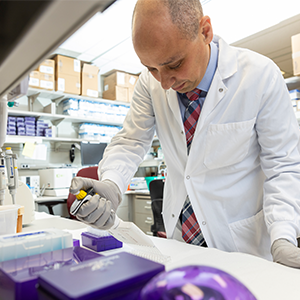-
Research Identifies Potential Drug Targets for Incurable Cancer of Small Bowel
ROCHESTER, Minn. — Researchers at Mayo Clinic have completed the world's first whole exome sequence of small intestine neuroendocrine tumors, also known to patients and physicians as carcinoids, the most common cancer of the small bowel and one that responds poorly to chemotherapy. Sequence analysis revealed six pathways as potential drug targets for this type of cancer.
MULTIMEDIA ALERT: Video of Dr. Banck is available for journalists to download on the Mayo Clinic News Network.
"This is a very important step in achieving targeted therapies and individualized treatment approaches for patients with small bowel carcinoids," says Michaela Banck, M.D., a Mayo oncologist and lead author of a new study in the June edition of the Journal of Clinical Investigation. "Genomic analysis of the individual patient's tumors will help us identify new drugs that are targeted to the individual's disease."
The study revealed genomic alterations that might be susceptible to chemotherapy in the majority of patients (72 percent). Accordingly, an implied therapeutic road map for small intestine carcinoids might feature many related, but distinct, paths defined by individualized approaches and pharmacogenomics.
Dr. Banck's team, including Mayo oncologist and senior author Andreas Beutler, M.D., sequenced the genes of small intestine neuroendocrine tumors from 48 patients, along with the normal (or germline) tissue of those same 48 patients. Comparative analysis of the 96 whole exome sequences revealed that small intestine neuroendocrine tumors carry low numbers of point mutations and characteristic recurrent patterns of gene duplications and losses.
The study was supported by grants from the Mayo Clinic Center for Individualized Medicine, Mayo Clinic, and the The Richard M. Schulze Family Foundation.
Study authors also include Rahul Kanwar, Amit Kulkarni, M.B.B.S., Ganesh Boora, M.B.B.S., M.D., Franziska Metge*, Benjamin Kipp, Ph.D., Lizhi Zhang, M.D., Erik Thorland, Ph.D., Kay Minn*, Bruce Eckloff, Eric Wieben, Ph.D., Yanhong Wu, Ph.D., Julie M. Cunningham, Ph.D., David Nagorney, M.D., Judith Gilbert*, Matthew Ames, Ph.D., and Ramesh Tentu, M.D.*, all of Mayo Clinic. (*These authors worked on this study while at Mayo Clinic but have since left.)
About the Center for Individualized Medicine
The Center for Individualized Medicine discovers and integrates the latest in genomic, molecular and clinical sciences into personalized care for each Mayo Clinic patient.
About Mayo Clinic Cancer Center
As a leading institution funded by the National Cancer Institute, Mayo Clinic Cancer Center conducts basic, clinical and population science research, translating discoveries into improved methods for prevention, diagnosis, prognosis and therapy. For information on cancer clinical trials, call 507-538-7623.







